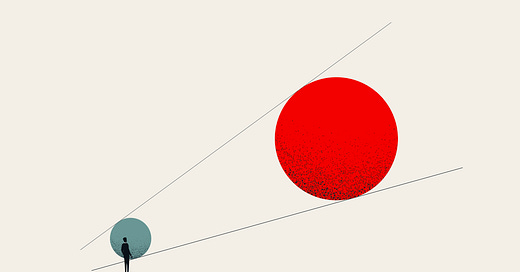Reading time: 4 minutes
Ishmael or Ahab?
Both men are aboard the Pequod and searching for the elusive white whale, yet have fates that could not be more different. Herman Melville’s iconic characters remind us why we should take something self-limiting and instead see it as an advantage.
Dogma vs. Discovery
Captain Ahab, the battle-hardened commander of the Pequod, embarks on the voyage with a single, all-consuming goal: to hunt down and kill Moby Dick, the great white whale that cost him his leg. In Melville’s epic, Ahab’s mastery of the seas, specialised knowledge and years of experience in whaling, rather than serving as an asset, becomes the tunnel through which he views the world and fixates him on a perilous course dictated by obsession.
Ishmael, the humble narrator, joins the ship out of curiosity and a desire for adventure. While not entirely inexperienced — he has been to sea before as a merchant sailor — he learns as he goes, gradually acquiring the skills and understanding of the nuances of whaling life, from the technicalities of harpooning to the diverse cultural backgrounds of his fellow sailors. He enters a complex, challenging world as a keen observer with enough knowledge to have earned his place but not so much that he becomes entrapped by dogma. With this balance, Ishmael is one of the few crew members to survive the trip.
Neither a master whaler nor completely naive, Ishmael represents the sweet spot of ignorance. You can know too little. And you can most certainly know too much.
Balance
The history of innovation is littered with Ishmaels.
Coco Chanel: no formal design training, but a seamstress with enough understanding of textiles to create “casual chic” as a departure from the restrictive corsets of the time. László Bíró: a Hungarian journalist with no prior knowledge of fluid dynamics and yet developed the ballpoint pen out of frustration. Orville and Wilbur Wright: bicycle shop owners with mechanical aptitude but no expertise in aviation that allowed them to question existing theories about flight. The list continues.
Buried in the industry-speak of creativity is the glorification of phrases like “be disruptive”. That’s as helpful as saying, “be intelligent.” What those people are referring to is what Ishmael represents — knowing something of the pursuit but with enough ignorance to approach the challenge in a way that those entrenched in the field it occupies cannot.
A balance.
Make the thing
A problem you may recognise is that creative people can be polite to a fault. I have lost count of the times that gifted creatives (students and veterans) have told me they want to do a thing, only to talk themselves out of it because they consider their current knowledge insufficient compared to “the people who should really do the thing.”
What is missed in those moments is that creative people possess all the tools required to enter a complex, challenging world as Ishmael did — a keen observer who gradually acquires skills and understanding — that place them at a comparative advantage to the unadaptable captains.
This polite hesitation is one of the main killers of creativity. How many books, films, products, services, inventions, and designs are whispered but not pursued because of the perceived requirement to be Ahab?
The internet does not help in this moment. Look too hard while deliberating your pursuit, and you will find a thousand people with biographies and by-lines that have been wordsmithed to signal superior knowledge. This makes the field exclusionary and leads to the assumption that those people already hold all the answers.
An assumption that forgets the couturiers who scoffed at Chanel's casual chic, the fountain pen manufacturers who dismissed Bíró's ballpoint as a fad, and the aeronautic experts who underestimated the Wright Brothers as backyard hobbyists. The corset, fountain pen, and long-distance travel industries were never the same again.
So, Ishmael or Ahab?






